人教版七年级下册 unit12 单元复习课件(共34张PPT)
文档属性
| 名称 | 人教版七年级下册 unit12 单元复习课件(共34张PPT) | 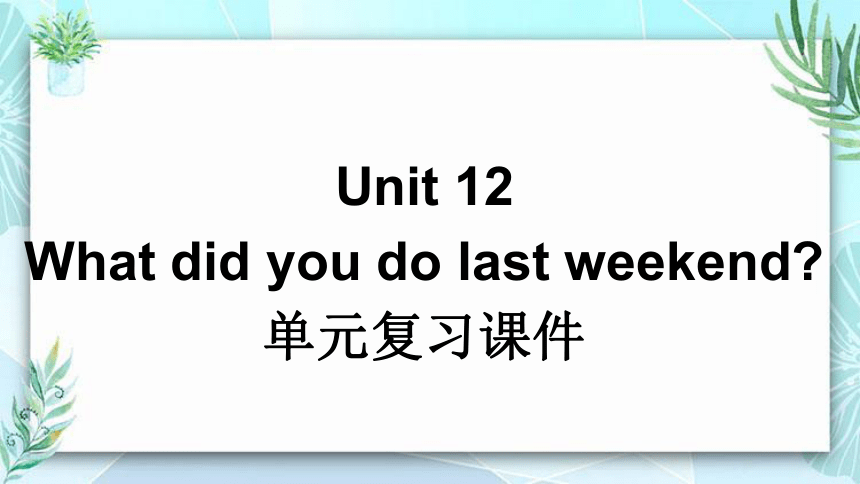 | |
| 格式 | pptx | ||
| 文件大小 | 195.3KB | ||
| 资源类型 | 教案 | ||
| 版本资源 | 人教新目标(Go for it)版 | ||
| 科目 | 英语 | ||
| 更新时间 | 2023-06-11 11:09:18 | ||
图片预览

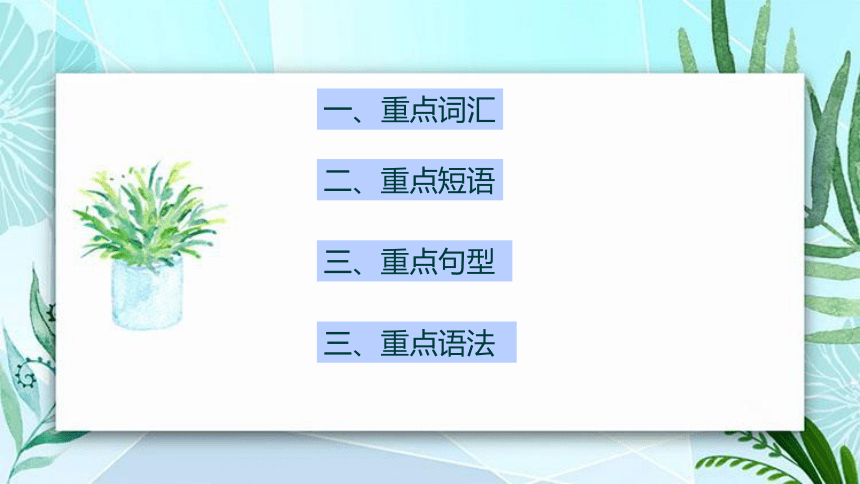
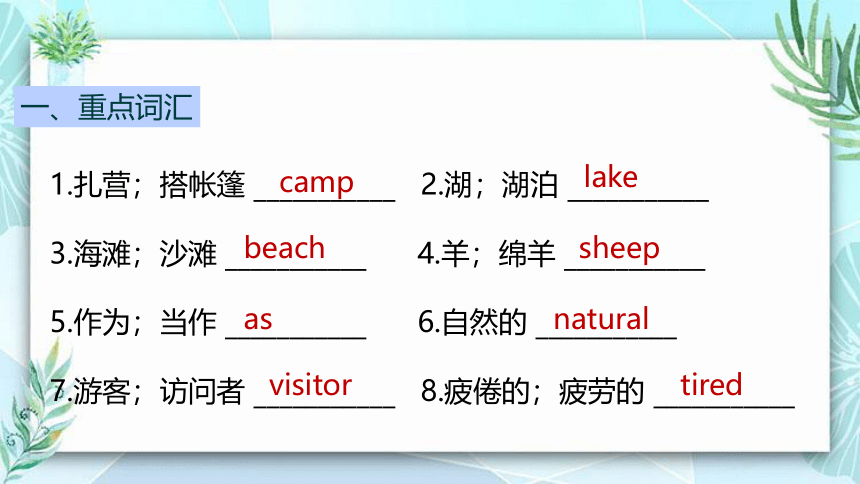
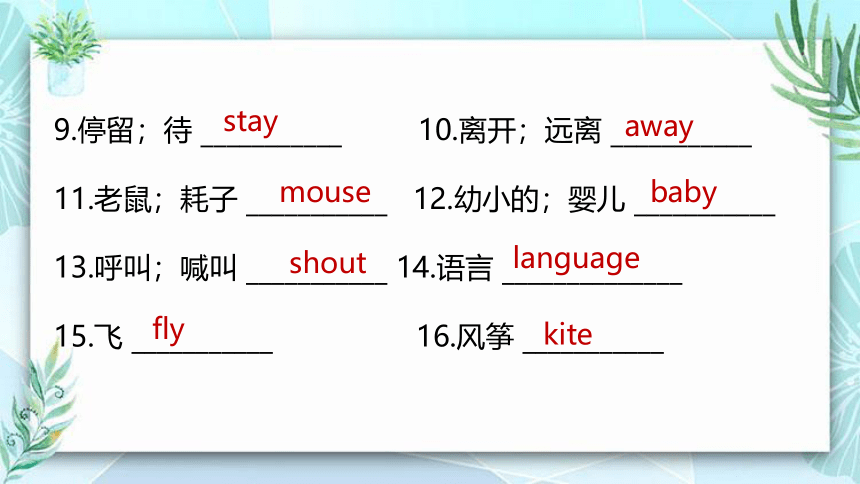
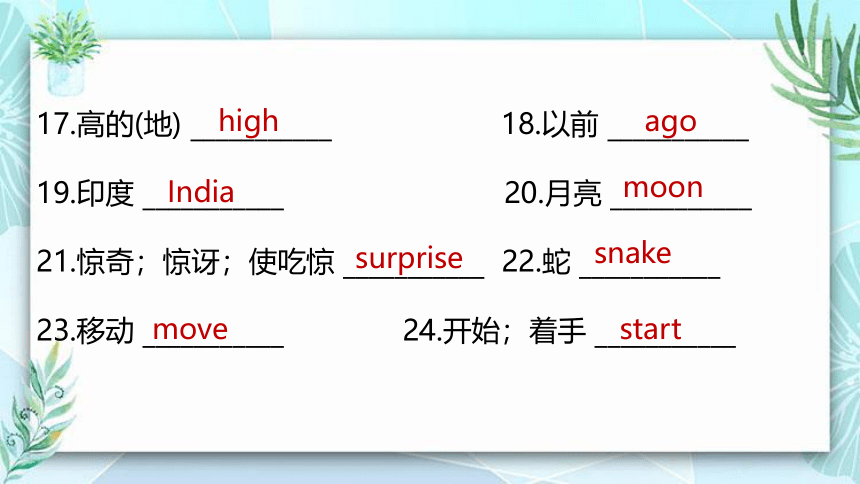
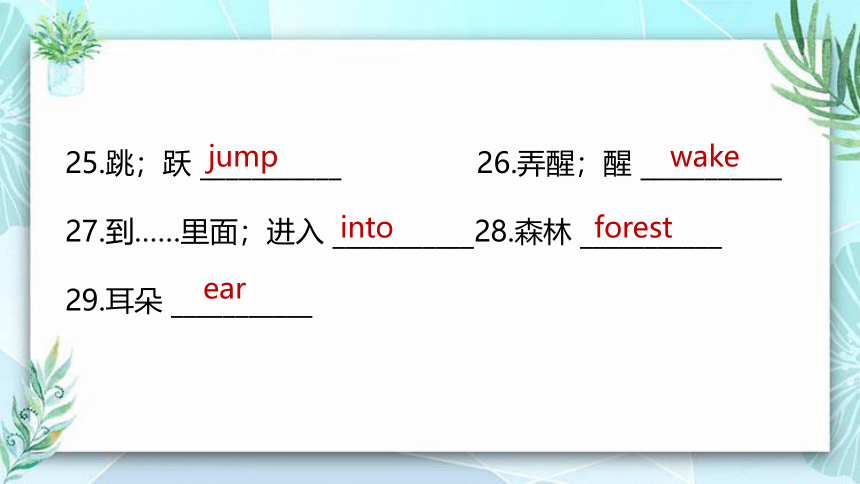
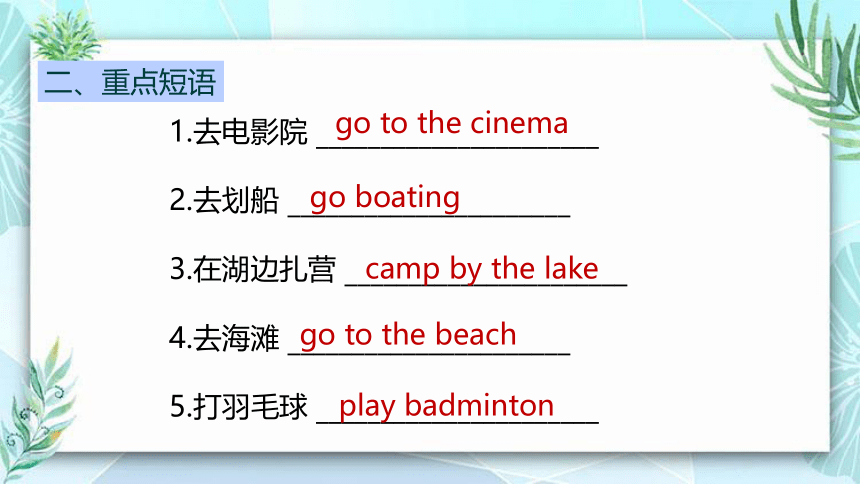
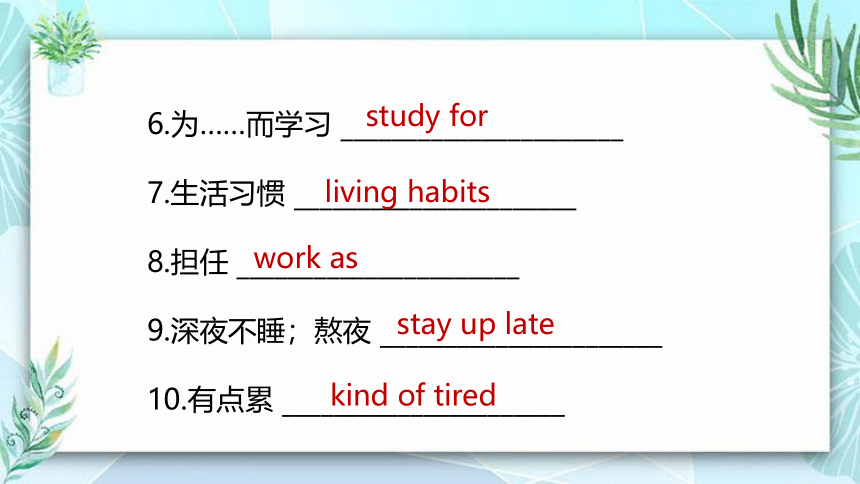
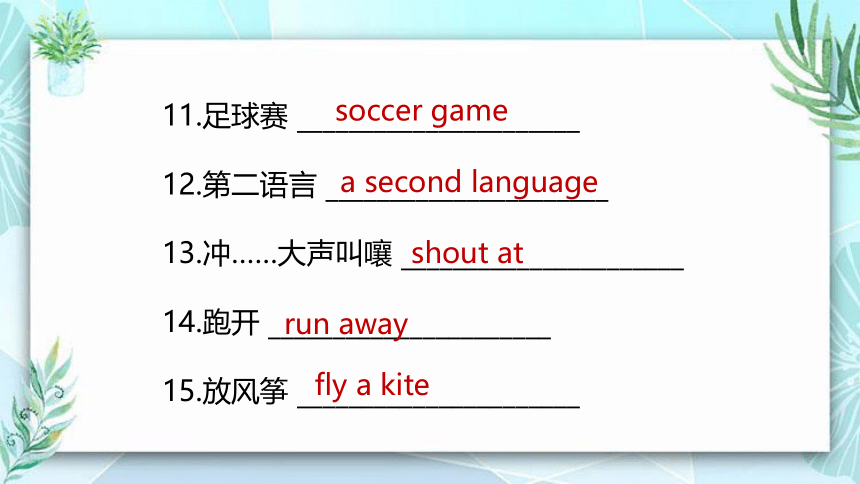
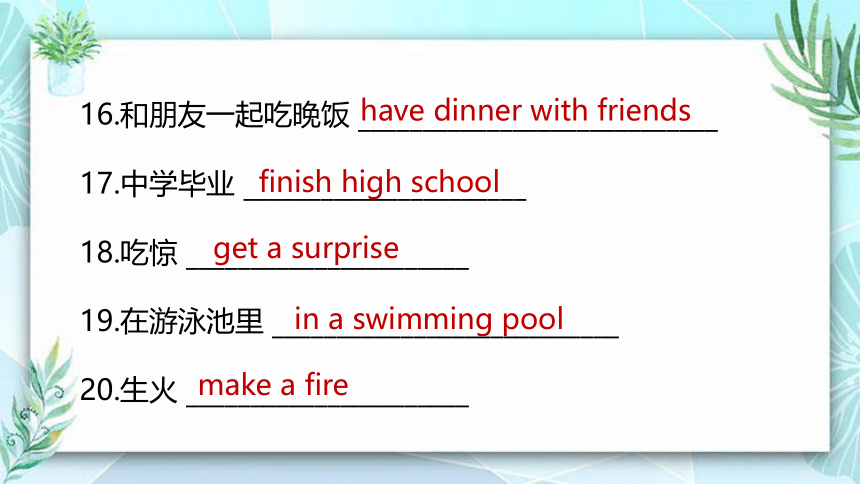

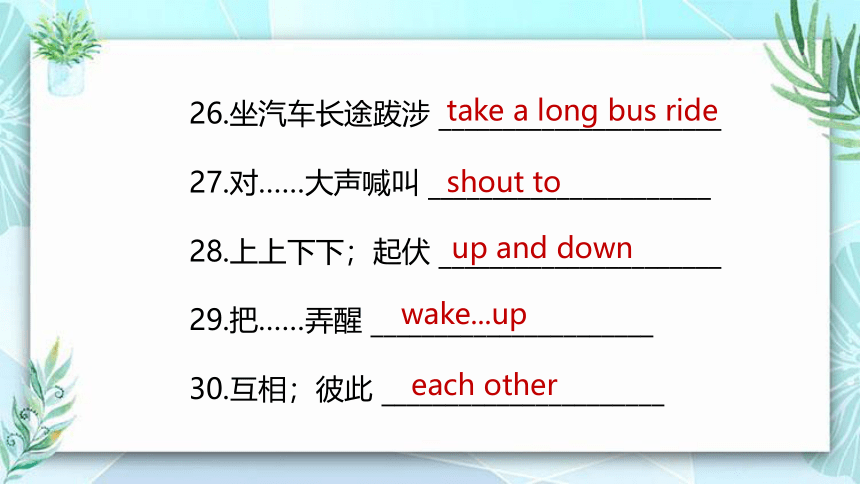
文档简介
(共34张PPT)
Unit 12
What did you do last weekend
单元复习课件
一、重点词汇
二、重点短语
三、重点句型
三、重点语法
一、重点词汇
1.扎营;搭帐篷 ___________ 2.湖;湖泊 ___________
3.海滩;沙滩 ___________ 4.羊;绵羊 ___________
5.作为;当作 ___________ 6.自然的 ___________
7.游客;访问者 ___________ 8.疲倦的;疲劳的 ___________
camp
lake
beach
sheep
as
natural
visitor
tired
9.停留;待 ___________ 10.离开;远离 ___________
11.老鼠;耗子 ___________ 12.幼小的;婴儿 ___________
13.呼叫;喊叫 ___________ 14.语言 ______________
15.飞 ___________ 16.风筝 ___________
stay
away
mouse
baby
shout
language
fly
kite
17.高的(地) ___________ 18.以前 ___________
19.印度 ___________ 20.月亮 ___________
21.惊奇;惊讶;使吃惊 ___________ 22.蛇 ___________
23.移动 ___________ 24.开始;着手 ___________
high
ago
India
moon
surprise
snake
move
start
25.跳;跃 ___________ 26.弄醒;醒 ___________
27.到……里面;进入 ___________28.森林 ___________
29.耳朵 ___________
jump
wake
into
forest
ear
二、重点短语
1.去电影院 ______________________
2.去划船 ______________________
3.在湖边扎营 ______________________
4.去海滩 ______________________
5.打羽毛球 ______________________
go to the cinema
go boating
camp by the lake
go to the beach
play badminton
6.为……而学习 ______________________
7.生活习惯 ______________________
8.担任 ______________________
9.深夜不睡;熬夜 ______________________
10.有点累 ______________________
study for
living habits
work as
stay up late
kind of tired
11.足球赛 ______________________
12.第二语言 ______________________
13.冲……大声叫嚷 ______________________
14.跑开 ______________________
15.放风筝 ______________________
soccer game
a second language
shout at
run away
fly a kite
16.和朋友一起吃晚饭 ____________________________
17.中学毕业 ______________________
18.吃惊 ______________________
19.在游泳池里 ___________________________
20.生火 ______________________
have dinner with friends
finish high school
get a surprise
in a swimming pool
make a fire
21.搭帐篷 ______________________
22.保暖 ______________________
23.野营 ______________________
24.去睡觉 ______________________
25.朝……外面看 ______________________
put up the tent
keep warm
go camping
go to sleep
look out of
26.坐汽车长途跋涉 ______________________
27.对……大声喊叫 ______________________
28.上上下下;起伏 ______________________
29.把……弄醒 ______________________
30.互相;彼此 ______________________
take a long bus ride
shout to
up and down
wake...up
each other
三、重点句型
1.你上周末做了什么?
_______ ____ _____ ______ last weekend
2.---她上周末去哪儿呢?---她去了农场。
---_______ ____ _____ ______ last weekend
---She _______ ____ _____ ______.
3.我在自然历史博物馆当过导游。
I _______ ____ _____ _________ at the Natural History Museum.
What did you do
Where did she go
went to a farm
worked as a guide
4.她和谁一起去的?
_______ did she _______ ________
5.是的,很棒,但我现在有点儿累。
Yeah,it was good,but I'm _______ ____ _____ now.
6.我熬夜看足球赛了。
I _______ ____ _______ ____ ________ the soccer game.
7.那就是学习第二语言很重要的原因。
That's ______ ____ __________ ___ ________ a second language.
Who
go with
kind of tired
stayed up late to watch
why it’s important to learn
8.上周你做什么有趣的事了吗?
________ you do ____________ _____________ last weekend
9.作为一份特殊的礼物,我们的父母带我们去了印度。
________ a special gift,our parents _______ ____ _____ India.
10.在那儿我们搭起帐篷,生起一堆篝火来取暖并在篝火上面做饭。
There we _______ ____ our tents and _______ ____ _____ ______ ________ us warm and cook food on.
Did
anything interesting
As
took us to
put up
made a fire to
keep
11.但是我太累了,以至于早早地就睡了。
But I was ___ ________ that I _______ ____ _______ early.
12.当我们向帐篷外面看时,我们看到了一条大蛇正睡在篝火旁边。
When we _________ ______ ____ our tent,we _______ a big snake _____________near the fire.
so tired
went to sleep
looked out of
saw
sleeping
13.第二天早晨,姐姐和我大吃一惊。
The next morning,my sister and I ____ __ _________ _________.
14.我们朝父母大喊,让他们知道我们的危险。
We __________ ____ our parents ____ _____ _______ ________ about the danger.
15.我爸爸开始在他们的帐篷里跳来跳去。
My dad ________ ____ ______ ____ ____ ______ in their tent.
got a terrible surprise
shouted to
to let them know
started to jump up and down
1. 一般过去时的用法
一般过去时(二)
表示说话前所发生的动作。
(1) 例句: 他让我们摘苹果。
He told us to pick apples.
表示过去所发生的一系列动作。
(2) 例句:放学后,我骑自行车赶回家,下车,放下
我的书包,然后就进屋了。
After school I hurried to ride my bike, got
off the bike, put down my bag and went
into the house.
讲述(过去的)故事或表示已故的人所做的事情。
(3) 例句:雷锋同志在他的生命中总是做好事。
Comrade Lei Feng did good deeds in his
life.
2. 一般过去时的特殊疑问句
(1) ① 上个周末你过得怎么样?
_____ ____ your last weekend
② 昨天下午他们在哪里?
______ _____ they yesterday afternoon
How was
Where were
③ 昨天晚上谁在教室里?
______ _____ in the classroom last night
④ 昨天你为什么迟到了?
______ _______ you late yesterday
Who was
Why were
特殊疑问词+was/were+主语+其他
(2) ① 昨天他做了什么事情?
_____ ____ he do yesterday
② 上个周末她参观了什么地方?
______ ____ she _____ last weekend
What did
Where did visit
③ 你和谁一起去的动物园?
_____ ____ you go to the zoo ____
④ 他们什么时候到达北京的?
______ ____ they arrive in Beijing
Who did
with
When did
特殊疑问词+did +动词原形+主语+其他?
(1)例如: yesterday, yesterday morning(afternoon,
evening), last weekend (year, week,
month), in 1992, two weeks ago.
(2)有时与连词 when,after,before,until等引
导的表示过去的时间状语从句连用。
3. 一般过去时的时间状语
一般过去时
1. 一般过去时的用法
(1) 表示说话前所发生的动作。
2. 一般过去时的特殊疑问句
特殊疑问词+was/were+主语+其他
(2) 表示过去所发生的一系列动作。
(3) 讲述(过去的)故事或表示已故
的人所做的事情。
3. 一般过去时的时间状语
1. 肯定句变否定句
一般过去时的句式转换
(1)当句中含有情态动词 could, would, should
等时,可直接在情态动词后加 not。
You should go to the zoo first.
You shouldn’t go to the zoo first.
(2) 当句中含有 was/ were 时,可直接在was/
were 后加 not。
She was in the library yesterday.
She wasn’t in the library yesterday.
(3)当句中的谓语动词是实义动词时,需在该动
词前加 didn’t,动词还原为原形。
She went to the park last week.
She didn’t go to the park last week.
2. 陈述句变一般疑问句
(1) 如果句中有 was/ were 或情态动词 could,
would, should 等时,只需要把这些词移到句首。
She was in the library yesterday.
Was she in the library yesterday
She can play football.
Can she play football
(2)谓语动词是实义动词时,需要在主语前加
did,谓语动词还原为原形。
She went to the park last week.
Did she go to the park last week
注意:当陈述句的主语是第一人称时,变疑 问句时,应改为第二人称,句末改为问号。
I stayed at home last weekend.
Did you stay at home last weekend
3. 陈述句变特殊疑问句
特殊疑问句时由疑问词开头,对句子中某一成分
提问的句子。常见的疑问词有:
who/whom (对人提问); what (对物提问);where (对地点提问); how far (对距离提问);
why (对原因提问); how long (对长度提问);how often (对频率提问);
when/what time (对时间提问);
They played football for two hours yesterday.
How long did they play football yesterday
Mr. Li was in the classroom just now.
Who was in the classroom just now
Mr. Li was in the classroom just now.
Where was Mr. Li just now
Unit 12
What did you do last weekend
单元复习课件
一、重点词汇
二、重点短语
三、重点句型
三、重点语法
一、重点词汇
1.扎营;搭帐篷 ___________ 2.湖;湖泊 ___________
3.海滩;沙滩 ___________ 4.羊;绵羊 ___________
5.作为;当作 ___________ 6.自然的 ___________
7.游客;访问者 ___________ 8.疲倦的;疲劳的 ___________
camp
lake
beach
sheep
as
natural
visitor
tired
9.停留;待 ___________ 10.离开;远离 ___________
11.老鼠;耗子 ___________ 12.幼小的;婴儿 ___________
13.呼叫;喊叫 ___________ 14.语言 ______________
15.飞 ___________ 16.风筝 ___________
stay
away
mouse
baby
shout
language
fly
kite
17.高的(地) ___________ 18.以前 ___________
19.印度 ___________ 20.月亮 ___________
21.惊奇;惊讶;使吃惊 ___________ 22.蛇 ___________
23.移动 ___________ 24.开始;着手 ___________
high
ago
India
moon
surprise
snake
move
start
25.跳;跃 ___________ 26.弄醒;醒 ___________
27.到……里面;进入 ___________28.森林 ___________
29.耳朵 ___________
jump
wake
into
forest
ear
二、重点短语
1.去电影院 ______________________
2.去划船 ______________________
3.在湖边扎营 ______________________
4.去海滩 ______________________
5.打羽毛球 ______________________
go to the cinema
go boating
camp by the lake
go to the beach
play badminton
6.为……而学习 ______________________
7.生活习惯 ______________________
8.担任 ______________________
9.深夜不睡;熬夜 ______________________
10.有点累 ______________________
study for
living habits
work as
stay up late
kind of tired
11.足球赛 ______________________
12.第二语言 ______________________
13.冲……大声叫嚷 ______________________
14.跑开 ______________________
15.放风筝 ______________________
soccer game
a second language
shout at
run away
fly a kite
16.和朋友一起吃晚饭 ____________________________
17.中学毕业 ______________________
18.吃惊 ______________________
19.在游泳池里 ___________________________
20.生火 ______________________
have dinner with friends
finish high school
get a surprise
in a swimming pool
make a fire
21.搭帐篷 ______________________
22.保暖 ______________________
23.野营 ______________________
24.去睡觉 ______________________
25.朝……外面看 ______________________
put up the tent
keep warm
go camping
go to sleep
look out of
26.坐汽车长途跋涉 ______________________
27.对……大声喊叫 ______________________
28.上上下下;起伏 ______________________
29.把……弄醒 ______________________
30.互相;彼此 ______________________
take a long bus ride
shout to
up and down
wake...up
each other
三、重点句型
1.你上周末做了什么?
_______ ____ _____ ______ last weekend
2.---她上周末去哪儿呢?---她去了农场。
---_______ ____ _____ ______ last weekend
---She _______ ____ _____ ______.
3.我在自然历史博物馆当过导游。
I _______ ____ _____ _________ at the Natural History Museum.
What did you do
Where did she go
went to a farm
worked as a guide
4.她和谁一起去的?
_______ did she _______ ________
5.是的,很棒,但我现在有点儿累。
Yeah,it was good,but I'm _______ ____ _____ now.
6.我熬夜看足球赛了。
I _______ ____ _______ ____ ________ the soccer game.
7.那就是学习第二语言很重要的原因。
That's ______ ____ __________ ___ ________ a second language.
Who
go with
kind of tired
stayed up late to watch
why it’s important to learn
8.上周你做什么有趣的事了吗?
________ you do ____________ _____________ last weekend
9.作为一份特殊的礼物,我们的父母带我们去了印度。
________ a special gift,our parents _______ ____ _____ India.
10.在那儿我们搭起帐篷,生起一堆篝火来取暖并在篝火上面做饭。
There we _______ ____ our tents and _______ ____ _____ ______ ________ us warm and cook food on.
Did
anything interesting
As
took us to
put up
made a fire to
keep
11.但是我太累了,以至于早早地就睡了。
But I was ___ ________ that I _______ ____ _______ early.
12.当我们向帐篷外面看时,我们看到了一条大蛇正睡在篝火旁边。
When we _________ ______ ____ our tent,we _______ a big snake _____________near the fire.
so tired
went to sleep
looked out of
saw
sleeping
13.第二天早晨,姐姐和我大吃一惊。
The next morning,my sister and I ____ __ _________ _________.
14.我们朝父母大喊,让他们知道我们的危险。
We __________ ____ our parents ____ _____ _______ ________ about the danger.
15.我爸爸开始在他们的帐篷里跳来跳去。
My dad ________ ____ ______ ____ ____ ______ in their tent.
got a terrible surprise
shouted to
to let them know
started to jump up and down
1. 一般过去时的用法
一般过去时(二)
表示说话前所发生的动作。
(1) 例句: 他让我们摘苹果。
He told us to pick apples.
表示过去所发生的一系列动作。
(2) 例句:放学后,我骑自行车赶回家,下车,放下
我的书包,然后就进屋了。
After school I hurried to ride my bike, got
off the bike, put down my bag and went
into the house.
讲述(过去的)故事或表示已故的人所做的事情。
(3) 例句:雷锋同志在他的生命中总是做好事。
Comrade Lei Feng did good deeds in his
life.
2. 一般过去时的特殊疑问句
(1) ① 上个周末你过得怎么样?
_____ ____ your last weekend
② 昨天下午他们在哪里?
______ _____ they yesterday afternoon
How was
Where were
③ 昨天晚上谁在教室里?
______ _____ in the classroom last night
④ 昨天你为什么迟到了?
______ _______ you late yesterday
Who was
Why were
特殊疑问词+was/were+主语+其他
(2) ① 昨天他做了什么事情?
_____ ____ he do yesterday
② 上个周末她参观了什么地方?
______ ____ she _____ last weekend
What did
Where did visit
③ 你和谁一起去的动物园?
_____ ____ you go to the zoo ____
④ 他们什么时候到达北京的?
______ ____ they arrive in Beijing
Who did
with
When did
特殊疑问词+did +动词原形+主语+其他?
(1)例如: yesterday, yesterday morning(afternoon,
evening), last weekend (year, week,
month), in 1992, two weeks ago.
(2)有时与连词 when,after,before,until等引
导的表示过去的时间状语从句连用。
3. 一般过去时的时间状语
一般过去时
1. 一般过去时的用法
(1) 表示说话前所发生的动作。
2. 一般过去时的特殊疑问句
特殊疑问词+was/were+主语+其他
(2) 表示过去所发生的一系列动作。
(3) 讲述(过去的)故事或表示已故
的人所做的事情。
3. 一般过去时的时间状语
1. 肯定句变否定句
一般过去时的句式转换
(1)当句中含有情态动词 could, would, should
等时,可直接在情态动词后加 not。
You should go to the zoo first.
You shouldn’t go to the zoo first.
(2) 当句中含有 was/ were 时,可直接在was/
were 后加 not。
She was in the library yesterday.
She wasn’t in the library yesterday.
(3)当句中的谓语动词是实义动词时,需在该动
词前加 didn’t,动词还原为原形。
She went to the park last week.
She didn’t go to the park last week.
2. 陈述句变一般疑问句
(1) 如果句中有 was/ were 或情态动词 could,
would, should 等时,只需要把这些词移到句首。
She was in the library yesterday.
Was she in the library yesterday
She can play football.
Can she play football
(2)谓语动词是实义动词时,需要在主语前加
did,谓语动词还原为原形。
She went to the park last week.
Did she go to the park last week
注意:当陈述句的主语是第一人称时,变疑 问句时,应改为第二人称,句末改为问号。
I stayed at home last weekend.
Did you stay at home last weekend
3. 陈述句变特殊疑问句
特殊疑问句时由疑问词开头,对句子中某一成分
提问的句子。常见的疑问词有:
who/whom (对人提问); what (对物提问);where (对地点提问); how far (对距离提问);
why (对原因提问); how long (对长度提问);how often (对频率提问);
when/what time (对时间提问);
They played football for two hours yesterday.
How long did they play football yesterday
Mr. Li was in the classroom just now.
Who was in the classroom just now
Mr. Li was in the classroom just now.
Where was Mr. Li just now
同课章节目录
- Unit 1 Can you play the guitar?
- Section A
- Section B
- Unit 2 What time do you go to school?
- Section A
- Section B
- Unit 3 How do you get to school?
- Section A
- Section B
- Unit 4 Don't eat in class.
- Section A
- Section B
- Unit 5 Why do you like pandas?
- Section A
- Section B
- Unit 6 I'm watching TV.
- Section A
- Section B
- Review of Units 1-6
- Unit 7 It's raining!
- Section A
- Section B
- Unit 8 Is there a post office near here?
- Section A
- Section B
- Unit 9 What does he look like?
- Section A
- Section B
- Unit 10 I'd like some noodles.
- Section A
- Section B
- Unit 11 How was your school trip?
- Section A
- Section B
- Unit 12 What did you do last weekend?
- Section A
- Section B
